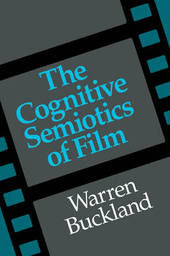
|
The Cognitive Semiotics of Film
Paperback / softback
Main Details
| Title |
The Cognitive Semiotics of Film
|
| Authors and Contributors |
By (author) Warren Buckland
|
| Physical Properties |
| Format:Paperback / softback | | Pages:188 | | Dimensions(mm): Height 229,Width 153 |
|
| Category/Genre | Film theory and criticism |
|---|
| ISBN/Barcode |
9780521037150
|
| Classifications | Dewey:791.4301 |
|---|
| Audience | | Professional & Vocational | |
|---|
| Illustrations |
4 Line drawings, unspecified
|
|
Publishing Details |
| Publisher |
Cambridge University Press
|
| Imprint |
Cambridge University Press
|
| Publication Date |
17 May 2007 |
| Publication Country |
United Kingdom
|
Description
In The Cognitive Semiotics of Film, Warren Buckland argues that the conflict between cognitive film theory and contemporary film theory is unproductive. Examining and developing the work of 'cognitive film semiotics', a neglected branch of film theory that combines the insights of cognitive science with those of linguistics and semiotics, he investigates Michel Colin's cognitive semantic theory of film; Francesco Casetti and Christian Metz's theories of film enunciation; Roger Odin's cognitive-pragmatic film theory; and Michel Colin and Dominique Chateau's cognitive studies of film syntax, which are viewed within the framework of Noam Chomsky's transformational generative grammar. Presenting a survey of cognitive film semiotics, this study also re-evaluates the film semiotics of the 1960s, highlights the weaknesses of American cognitive film theory, and challenges the move toward 'post-theory' in film studies.
Reviews"Students ans scholars of film at all levels will profit from having this study available in English for the first time. In writing his volume, Buckland drew on cognitive semantic theory of Michel Colin, Francesco Casetti and Christian Metz's theories of film enunciation, Roger Odin's cognitve-pragmatic film and Noam Chomsky's transformational generative grammar, thereby producing a study that will be beyond the average undergraduate. Libraries serving undergraduates will want to consider Mitry's book." Choice
|